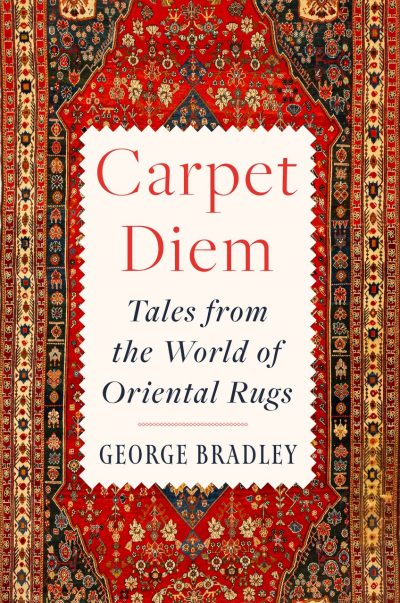Newly Released
Harper Collins, 2025
Carpet Diem chronicles Bradley’s exploration of the world of oriental carpets, an exploration in which he falls in love with a variety of captivating rugs and learns about the cultural background of the people who made them. A journey from innocence to experience, his entertaining account includes his encounters with the dealers, collectors, scroungers, restorers, and connoisseurs who inhabit a secretive and sometimes shady milieu. As he brings together his own story with those of these characters, he tells also some of the history of what is one of the world’s great artforms. Like Scheherazade, Bradley spins tale after tale about the sort of gorgeous textiles found on the floors of mansions across Europe and America, in the portraits of Titian and Vermeer, in the faraway caves of Central Asia, and in bespoke shops of Manhattan, the Hamptons, and Connecticut.
Reviews
“What Carpet Diem reminds me is that elegant, fast-paced, honest, charming, witty, and precise writing can make you care deeply—even passionately—about anything. This book made what was previously invisibleor opaque or irrelevant to me immediately indispensable and riveting. Read it! It’s a wonderful surprise.”
—Jacqueline Osherow, Author of Divine Ratios
“Some achieve addiction, some have addiction thrust upon them,” says Bradley of his adventures and misadventures in oriental rug collecting. His is an unexpectedly engrossing account of a decades-long preoccupation with carpets, their history and lore, and his interactions with kindred connoisseurs, dealers, restorers, and disreputable players in the trade. A poet, olive oil importer, and former sommelier, Bradley is a member of New York’s Hajji Baba Club, a group devoted to the appreciation and collection of fine rugs, antique and otherwise. Even those not immediately drawn to the subject will find his weave hard to resist. A carpet isn’t a product so much as a culture of considerable complexity, and Carpet Diem is an education. Bradley’s take on the strategies of bargaining—a chess (or fencing) match with feints and misdirection, moves and countermoves—is particularly enjoyable. Fine carpets, says the author, are a testament to painstaking manual skill: “There’s nothing that requires more craftsmanship than weaving a fine oriental carpet…. As decorative items, they go in and out of fashion, but collectors have never abandoned them.” Bradley’s prose is crisp, fresh as a new loaf of bread, and not without a certain elegance of description. He can paint vivid word pictures, especially of New England and Asia. Bradley augments his book with engaging asides, a detailed appendix, a glossary of terms, a bibliography, and 11 full-color photographs. The allure of artisanal rugs is afforded the treatment it deserves.
—Kirkus Reviews

